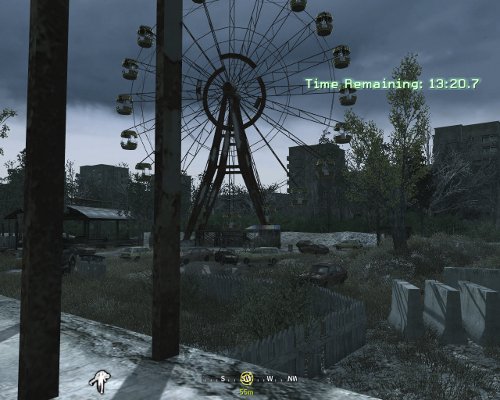GSC Gameworld's S.T.A.L.K.E.R. games (which shall henceforth be referred to with no attention for the pointless acronym) can be viewed as a point of contention; a point which was sorely lost on me until a recent moment of brief contemplation.
The series, now in its third iteration (tentatively titled Call of Pripyat,) is based within the Chernobyl exclusion zone, taking place in a fictional future in which subsequent reactor explosions occur and serve to worsen the irradiated state that the area is actually in.
And if cartoons have taught us anything, then we all know what that means: horrifically awesome mutation! I'm talking about:
Suspiciously Lenin-reminiscent Tentacle Face Man!
Leaping Gasmask Trunk Crusader!
Rejected Super Monkey Ball Auditionee!
…and This Thing!

So far, a solid premise: a well rounded first person shooter/survival horror. But stop. Take a step back. The Chernobyl disaster was one of the worst atrocities in the entire history of mankind. The huge area surrounding the power plant is humanly uninhabitable, and will be for what is calculated to be at least another two hundred years. It caused a great many deaths, and the radiation affected people in such a way that even today, children are being born with physical and mental deformities and disabilities. To post a picture here would be gratuitous, but the images of some of these children are genuinely scarring. They are the real world equivalent of the creatures which the game refers to as 'mutants' with what could be viewed as throwaway disregard, and many of them are clearly intended to have mutated from humans.
Obviously I won't be foolish enough to suggest any comparisons between reality and the vision of the developers; as was previously mentioned, the games take place in an alternate future where the area's exposure to radiation has increased through further disasters, but the premise remains a dubious one. The idea of a highly irradiated land and the fantasy possibility of otherworldly mutations in an atmospherically hollow environment is undeniably something which could be conjured when hearing about the events that transpired, but to base it in Chernobyl rather than translate the ideas to a fictional palette seems as through it could well be construed as exploitation.
You may recall that Call of Duty 4 also used Chernobyl as a backdrop for a number of its missions, leading into and around an accurate recreation of the city of Pripyat. This accuracy, unlike the Stalker games, is also seemingly reflected in the environment and nature; the area bears no signs of domestic human life, and certainly contains no feverishly imagined horror-mutations. There is even some small commentary on the poignancy of the atrocity that befell the area (though this pales into insignificance when you have to blow half of its immaculately represented fairground to shit using mines and grenades.)
To complain about the Stalker games being offensive is probably an exercise in over-sensitivity, which, like almost all other kinds of over-sensitivity, will probably lead to something premature (oh no I didn't!) In the case of these games, however, this premature conclusion would be to write them off. They're intelligently and lovingly created and provide a truly unique experience, and honestly, in playing, they feel far enough from reality that they at no point feel like poor taste. It is clear that no malice has been intended (with the developers themselves being Ukrainian,) though it is some wonder whether or not they realised at any point during the game's conception that it may not go down entirely smoothly with those connected to the incident. It is another case of a product's worst criticisms being sourced with those who have little to no experience with or knowledge of the product; a frequently recurrent issue where video games are concerned, and most certainly a frustrating one for both developers and consumers.
More here than ever, though, it is possible to empathise with these critics, and from an exterior perspective these games beat even the infamous Grand Theft Auto series with regards to prospective arguments of poor taste. Through this, I think that GSC Gameworld can find comfort in the fact that the games they have created lack the kind of mainstream appeal and big budget PR of Rockstar Games' big name franchise.
VentureBeat's mission is to be a digital town square for technical decision-makers to gain knowledge about transformative enterprise technology and transact. Learn More




